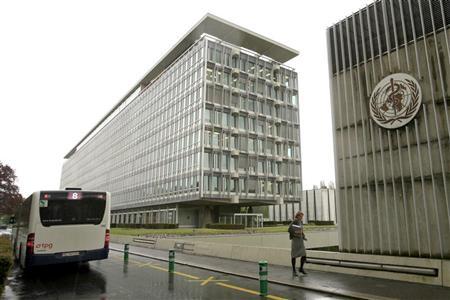Diesel Exhaust Fumes Cause Lung Cancer, WHO Says
Date: 13-Jun-12
Country: LONDON
Author: Kate Kelland

The World Health Organisation (WHO) headquarters are pictured in
Geneva April 27, 2009.
Photo: Denis Balibouse
Diesel engine fumes can cause lung cancer and belong in the same potentially deadly category as asbestos, arsenic and mustard gas, World Health Organisation (WHO) experts said on Tuesday.
In an announcement that caused concern in the auto industry, the France-based International Agency for Research on Cancer (IARC), part of the WHO, reclassified diesel exhausts from its group 2A of probable carcinogens to its group 1 of substances that have definite links to cancer.
The experts, who said their decision was unanimous and based on "compelling" scientific evidence, urged people worldwide to reduce their exposure to diesel fumes as much as possible.
"The working group found that diesel exhaust is a cause of lung cancer and also noted a positive association with an increased risk of bladder cancer," IARC said in a statement.
The decision was the result of a week-long meeting of independent experts who assessed the latest scientific evidence on the cancer-causing potential of diesel and gasoline exhausts.
It puts diesel exhaust fumes in the same risk category as a number of other noxious substances including asbestos, arsenic, mustard gas, alcohol and tobacco.
Christopher Portier, chairman of the IARC working group, said the group's conclusion "was unanimous, that diesel engine exhaust causes lung cancer in humans".
"Given the additional health impacts from diesel particulates, exposure to this mixture of chemicals should be reduced worldwide," he said in a statement.
PUBLIC HEALTH ISSUE
Diesel cars are mainly popular in western Europe, where tax advantages have boosted technological advances and demand.
Outside of Europe and India, diesel engines are almost entirely confined to commercial vehicles - mostly because of the fuel's greater efficiency. German carmakers are trying to raise awareness of the fuel in the United States, where the long distances travelled on highways suit diesel engines.
The European Automobile Manufacturers' Association said it was surprised by the WHO announcement and the industry would "have to study the findings in all their details".
"The latest diesel technology is really very clean," said spokeswoman Sigrid de Vries, adding the industry had been working on technologies to address health concerns.
Sean McAlinden, an analyst with the Center for Automotive Research in Michigan, said about 2 to 2.5 percent of light vehicles in the United States had diesel engines, but that was expected to rise to 8.5 percent by 2020.
IARC said large populations all over the world are exposed to diesel exhaust every day.
"People are exposed not only to motor vehicle exhausts but also to exhausts from other diesel engines...(such as diesel trains and ships) and from power generators," it said.
IARC's director Christopher Wild said that against this background, Tuesday's conclusion "sends a strong signal that public health action is warranted".
"This emphasis is needed globally, including among the more vulnerable populations in developing countries where new technology and protective measures may otherwise take many years to be adopted," he said in a statement.
DIESEL HAS CLEANED UP
For about 20 years, diesel engine exhaust was defined by IARC as probably carcinogenic to humans - group 2A - but an IARC advisory group has repeatedly recommended diesel engine exhaust as a high priority for re-evaluation since 1998.
The auto industry had argued diesel fumes should be given a less high-risk rating to reflect tighter emissions standards.
Reacting to the decision, Allen Schaeffer, executive director of the Washington-based Diesel Technology Forum said diesel engine and equipment makers, fuel refiners and emissions control technology makers have invested billions of dollars in research into technologies and strategies to reduce emissions.
The health charity Cancer Research UK welcomed the IARC move and said the evidence of harmful health effects of diesel had been accumulating for many years. But it added that "the overall number of lung cancers caused by diesel fumes is likely to be a fraction of those caused by smoking tobacco."
Cancer killed 7.6 million people worldwide in 2008, the most recent year for which the WHO has full data. Lung cancer was the most deadly type, accounting for 18 percent of cancer deaths.
IARC said it had considered recent advances in diesel technology which had cut levels of particulates and chemicals in exhaust fumes, particularly in developed economies, but said it was not yet clear how these might translate into health effects.
"Research into this question is needed," it said. "In addition, existing fuels and vehicles without these modifications will take many years to be replaced, particularly in less developed countries, where regulatory measures are currently also less stringent."
IARC said gasoline exhaust fumes should be classified as "probably carcinogenic to humans", a finding that was unchanged from its previous assessment in 1989.
(Additional reporting by Christiaan Hetzner in Frankfurt, Laurence Frost in Paris and Bernie Woodall in Detroit.; Editing by Andrew Heavens and Roger Atwood)
![]()
© Thomson Reuters 2012 All rights reserved